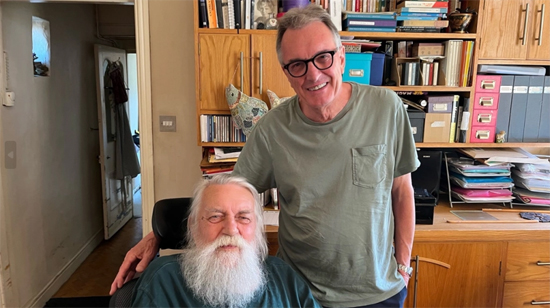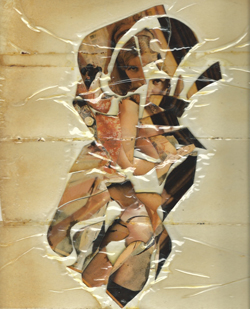| |
|
|
 On visiting a friend - thebluemoment.com - July 1, 2024 On visiting a friend - thebluemoment.com - July 1, 2024
The front of the home of Robert Wyatt and Alfie Benge, a pretty Georgian house on a quiet street close to the centre of the Lincolnshire market town of Louth, was bathed in sunshine as I pressed the bell one day last week. The door was opened by Dee, Robert’s daughter in law, who took me inside to see him.
I’ve known Robert since the end of the ’60s, when he was still with the Soft Machine. He and Alfie tell the story of how I officiated at their marriage one night at Ronnie Scott’s in the early ’70s, before his accident, using a twisted-up piece of silver paper from a cigarette packet as an improvised wedding ring. A couple of years later they were formally married at Sheen register office on the day of the release of the extraordinary Rock Bottom, his great 1974 album of songs expressing fathomless emotions.
Alfie was in London for attention to her eyes on the day I visited, to see Robert for the first time since before the pandemic. She’d warned me that, following his recovery from a near-fatal encounter with something nasty called Lewy Body Dementia, his memory was impaired, although “he’s far less away with the fairies than he was.” And his sight had improved after long-awaited double cataract surgery.
His eyes were bright as we started to talk, his conversation just about as animated and every bit as surreally funny as I remembered. A mention of that first informal wedding ceremony prompted him to talk about how he had been 10 years old when he first met Ronnie Scott, when they were both guests at Robert Graves’s famous house in Mallorca (Robert’s mother, Honor Wyatt, was a friend of the poet, and may have named her son after him). He loved Ronnie and his co-director Pete King — whose name provoked a chuckling mention of “The great smell of Brut!” — and the whole vibe of the club, where Alfie had worked behind the bar. He remembered young Henry, who looked after the cloakroom and saw the ageing Ben Webster safely home every night during the great and hard-drinking tenorist’s residencies.
We talked about a little about how Robert had enjoyed contributing vocals to three tracks on Artlessly Falling, Mary Halvorson’s second Code Girl album in 2020, about Duke Ellington, and about Gil Evans, another venerated figure whose “Las Vegas Tango” Robert turned into a mesmerisingly wayward two-part invention on his first solo album, End of an Ear, in 1970. And about the 1971 Berlin jazz festival, where Robert — having just left the Softs — was selected by the festival director, Jo Berendt, for the rhythm section accompanying a Violin Summit starring Don “Sugarcane” Harris, Jean-Luc Ponty, Michal Urbaniak and Nipso Brantner (“I don’t think they liked my playing — I was either too rock or too jazz”). When I remarked that a mutual acquaintance perhaps “fell in love too easily”, he picked up the cue, hummed the opening of “I Fall in Love Too Easily” and talked about how much he still enjoyed listening to Chet Baker singing such songs.
I stayed an hour and a half, longer than expected. On the long drive home I listened to Comicopera and …for the ghosts within, two late masterpieces. All in all it had been a joy to find that Robert is still entirely himself, one of the most original and loved figures of his generation, still living his “improvised life”, not making music any more but continuing to incarnate his socialist principles and thereby justifying his friend Brian Eno’s description of him (in Marcus O’Dair’s excellent authorised biography) as living without “any glaring inconsistencies between what he claims to believe in and what he does as a person and as an artist.”
Alfie wanted to leave me a copy of Side by Side, the book of poems, lyrics and drawings that she and Robert published in 2020. “It came out during the lockdown,” she said, “so it didn’t get much notice.” I told her I’d already bought one. If it escaped your attention, this might be the time to rectify that omission — maybe as a way of celebrating their the fiftieth anniversary of their wedding (the official one), which falls on July 26**: a milestone in a remarkable, wonderfully creative and happily enduring partnership.
* Side by Side by Robert Wyatt and Alfie Benge is published by Faber & Faber. Marcus O’Dair’s Different Every Time: The Authorised Biography of Robert Wyatt was published by Serpent’s Tail in 2014. The photograph of Robert and me was taken by his son, Sam Ellidge.
** Correction: the piece originally said that the anniversary is on July 24. It’s the 26th. Alfie also points out that that they originally chose the date to coincide with the first day of Fidel Castro’s first attempt to start the Cuban Revolution: the attack on the Moncada garrison in 1953.
Read the post on thebluemoment.com
| |
Ten years ago, Richard wrote this post on the same blog after reading that Robert Wyatt had decided to retire from music.
|
|
 Pieces of Robert Wyatt - thebluemoment.com - October 30, 2014 Pieces of Robert Wyatt - thebluemoment.com - October 30, 2014
When I read, in the new issue of Uncut magazine, that Robert Wyatt has decided to stop making music, I felt an immediate pang of dismay. So I rang him up to see if he really meant it. His reply was to tell me a little story about the novelist Jean Rhys, who, after a long period of inactivity, responded to her publisher’s gentle suggestion that she might like to write another book by asking him if he’d enjoyed her last one. “Yes, of course,” he answered. “Well, read it again,” Rhys said.
We could all do a lot worse than work our way through Robert’s albums, starting with 1970’s End of an Ear, which includes his fabulous deconstruction of Gil Evans’s “Las Vegas Tango”, and concluding with 2010’s magnificent ‘…for the ghosts within’, on which he shares the credit with the saxophonist Gilad Atzmon and the violinist/arranger Ros Stephen. And we could cherish memories of live performances stretching, in my case, from the Soft Machine at Croydon’s Fairfield Halls in 1970 to Robert’s guest appearance — singing and whistling on “Rado de Nube” and playing cornet on “Song for Che” — with Charlie Haden’s Liberation Music Orchestra as part of Ornette Coleman’s Meltdown season at the Festival Hall in 2009.
We can also read Marcus O’Dair’s Different Every Time, an “authorised biography” of Robert, published today. Diligently researched and sympathetically told, it gives us the best all-round view we’re likely to get of the man who came to attention baring his torso behind a drum kit with Soft Machine everywhere from UFO to the Proms before the accident in 1973, at the age of 28, that cost him the use of his legs and propelled him into a different sort of existence, the one that produced Rock Bottom, “I’m a Believer”, Ruth is Stranger than Richard, “Shipbuilding”, “At Last I Am Free”, Old Rottenhat, Dondestan, Shleep and Comicopera, as well as collaborations with the likes of Carla Bley, Brian Eno, the Raincoats, Scritti Politti, Hot Chip and many others, most of them listed in O’Dair’s discography.
I say “most of them” because I’ve noticed an omission: a 1970 session with the Amazing Band, featuring the great cartoonist/illustrator Mal Dean on trumpet, Rab Spall on violin and accordion, Maia Spall on voice, Mick Brennan and Chris Francis on alto saxophones, Jim Mullen on bass and harmonica and Wyatt on drums and voice. Soon after they recorded it, Robert gave me an acetate of the proposed album, with a sleeve he’d made up himself, featuring the collage you see above. It wasn’t until 1997 that the music — just under 40 minutes of free improvisation — finally saw the light of day, released under the title Roar on the FMR label.
I listened to the acetate again last night and it remains a lovely example of the kind of open-minded, non-idiomatic, anti-materialistic music that was in the air back then. And still is, if you look hard enough. I’m sorry, of course, that seemingly there won’t be any more of it from Robert himself. But what he’s given us is quite enough to be going on with.
* Different Every Time is published by Serpent’s Tail (£20). Robert Wyatt will be talking to Marcus O’Dair at the Queen Elizabeth Hall on November 23, as part of the EFG London Jazz Festival.
Read the post on thebluemoment.com
|



